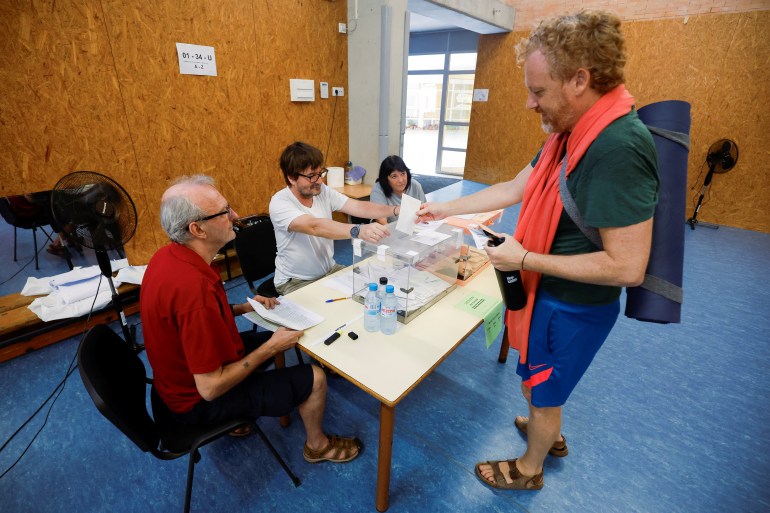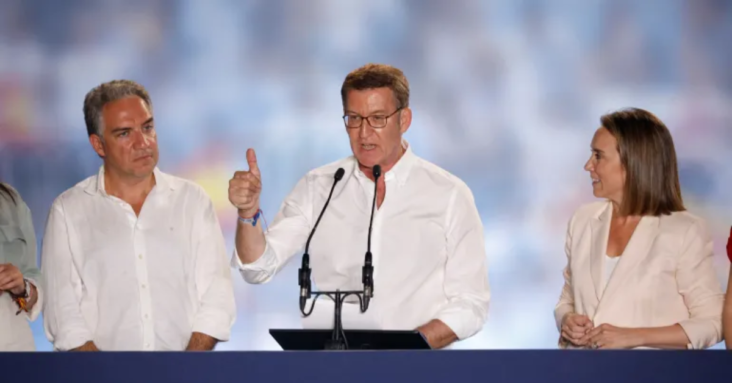
No single party or bloc is on course to win an outright majority in Spain’s snap general election, according to a tally with about 99 percent of votes counted.
The conservative People’s Party (PP) was set to narrowly win the election on Sunday but without the majority needed to topple the coalition government of Socialist Prime Minister Pedro Sanchez.
The PP was on course to secure 136 of the 350 seats in the Congress of Deputies, the lower house of the Spanish parliament.
Sanchez’s Spanish Socialist Workers Party was poised to take 122 seats, two more than it had in the outgoing legislature.
Although the Socialists can likely call on the predicted 31 seats of the left-wing Sumar (Joining Forces) alliance and several smaller parties to assemble more than the sum of Spain’s right-wing parties, there is a real possibility that neither side will be able to secure a majority.
The far-right Vox party was on 33 seats, still the third-largest force in parliament if 19 below its 2019 result, and their hypothetical tie-up with the PP falling short of an outright majority of 176 seats.
Pre-election polls had predicted a bigger victory for the PP and the possibility for it to form a coalition with Vox.
The close outcome could lead to weeks of political jockeying. The next prime minister would only be voted on once legislators are installed in the new parliament.
‘A divided country’
Pablo Calderon Martinez, a professor at Northeastern University, told Al Jazeera the preliminary election results revealed a “divided country” as both blocs fell short of a majority.
“It’s going to be interesting to see how they negotiate the next government,” Calderon Martinez said.
He said the left-wing bloc had performed better than predicted by most polls.
“The Socialist camp is going to be the happier of the two,” he said, adding that it was “a forgone conclusion” that the PP would have turned out to be the largest party in Congress.

Snap vote
The Socialists and the junior member of its coalition government took a beating from the conservative party and the far-right Vox party in regional and local elections in May, prompting Sanchez to call Sunday’s early election.
Most polling during the campaign forecast that the national vote would go the same way but require the PP to rely on support from Vox to form a government, with PP candidate Alberto Nunez Feijoo at the helm.
A PP-Vox government would have meant another European Union member has moved firmly to the right, a trend seen recently in Sweden, Finland and Italy.
Countries such as Germany and France are concerned about what such a shift would portend for EU immigration and climate policies.
Spain’s two main leftist parties are pro-EU participation. On the right, the PP is also in favour of the EU. Vox, headed by Santiago Abascal, is opposed to EU interference in Spain’s affairs.
The election comes as Spain holds the EU’s rotating presidency. Sanchez had hoped to use the six-month term to showcase the advances his government had made. An election defeat for Sanchez could see the PP taking over the EU presidency reins.
Voters braved soaring summer temperatures to cast their ballots on Sunday. Coming at the end of a month of heat waves, temperatures were expected to average above 35 degrees Celsius (95 degrees Fahrenheit), or 5C to 10C (41F to 50F) above normal in many parts of the country. Authorities distributed fans to many of the stations.
“We have the heat, but the right to exercise our vote freely is stronger than the heat,” said Rosa Maria Valladolid-Prieto, 79, in Barcelona.
Sánchez was one of the first to vote, casting his ballot at a polling station in Madrid. Commenting later on the large number of foreign media covering the election, he said: “This means that what happens today is going to be very important not just for us but also for Europe and I think that should also make us reflect.”
Sumar, which brings together 15 small leftist parties, is led by second Deputy Prime Minister Yolanda Díaz, the only woman among the top four candidates.
Díaz called for everyone to vote, recalling that the freedom to vote did not always exist in Spain.
“A lot is at risk,” Diáz said after casting her ballot. “For people of my generation, they are the most important elections.”
PP leader Feijoo said it was “clear that many things are in play, what model of country we want, to have a solid and strong government”.
Vox’s Abascal said he hoped for “a massive mobilisation [of voters] that will allow Spain to change direction”.

Sanchez’s government has steered Spain through the COVID-19 pandemic and dealt with an inflation-driven economic downturn made worse by Russia’s full-scale invasion of Ukraine.
But his dependency on fringe parties to keep his minority coalition afloat, including the separatist forces from Catalonia and the Basque Country, and his passing of a slew of liberal-minded laws may cost him his job.
The right-wing parties promised to roll back dozens of Sanchez’s laws, many of which have benefitted millions of citizens and thousands of companies.



